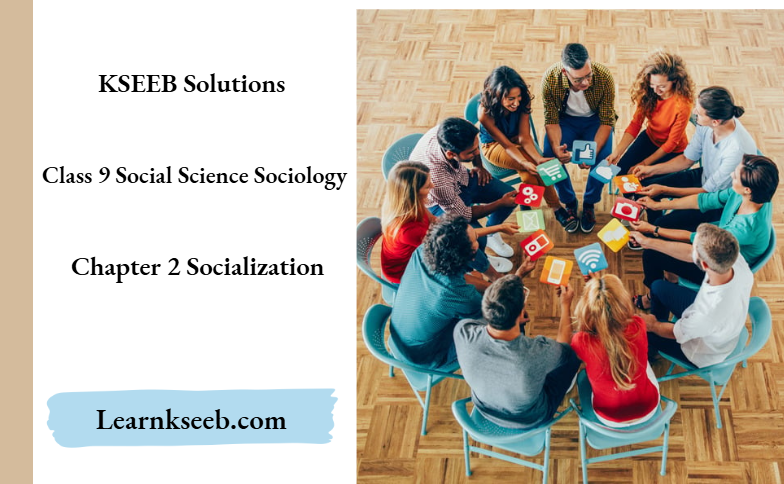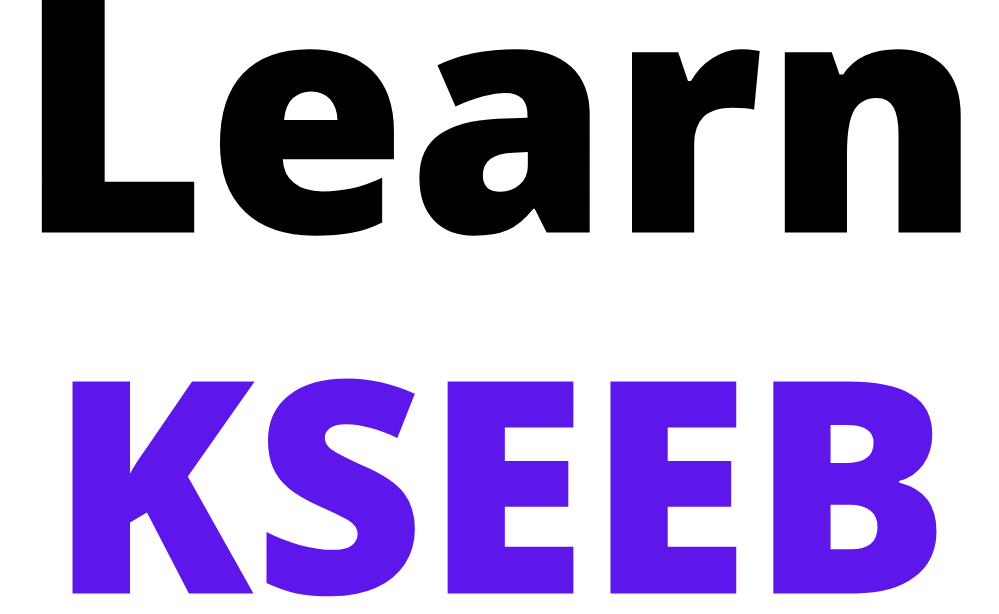KSEEB Solutions For Class 9 Social Science Sociology Chapter 2 Socialization Points To Remember
The process of learning social behaviour and the process of becoming a social being is called socialisation. The agents of socialisation are age, experience and the influence of elders. Secondly, the influence of the same age group. The saying that the mother is the first teacher to the child and the family is the first school of the child is literally true. The child learns its first lesson in love, affection, trust, patience, kindness, cooperation and other values at home. The child learns the social behaviours of same-age children which are unable to learn by their parents and teachers.
- Religion preaches to leading an ethical life. Children observe parents, elders and relatives visiting places of worship.
- The good behaviour, noble thinking and sense of equality expressed in the teachers’ behaviour make the children imbibe love, trust, patience, kind heartedness and other values of life.
- Television, movies, newspapers, periodicals, dramas, radio and other media make use of literature on a large scale.
- Advertisements, radio programmes, stories, poems, novels, dramas, dance, music, posters, quotations from great men, proverbs and words of wisdom influence children.
- The families which reside close to your family are called Neighbourhood.
- Neighbours share one another’s happiness and sorrow and live like members of the same family.
| Class 9 Social Science | Class 9 Science | Class 9 Maths |
Socialization Textual Questions And Answers
Fill in the blanks with suitable words.
- The changing process of man as a social being is called Socialization.
- Mother is the child’s first Teacher.
- An important agency of socialization is Family.
KSEEB Solutions for Class 9 Social Science Sociology Chapter 2
Discuss in a group and answer the following questions:
Question 1. Explain the role of school in the process of socialisation.
Answer:
The role of school in the process of socialisation is:
- The child gets influenced by its teachers and friends in addition to the influence of education.
- Through education, the child’s behaviour, knowledge, morality and attitude are shaped.
- The child’s innate abilities and talents get exposure.
- Education prepares children for the future.
- The good behaviour, noble thinking and sense of equality expressed in the teachers’ behaviour make the children imbibe love, trust, patience, kind-heartedness and other values of life.

Question 2. What are the values learned by a child from the family members?
Answer: The child learns its first lesson in love, affection, trust, patience, kindness, cooperation and other values at home.
Question 3. Explain the social importance of the socialisation process.
Answer:
The social importance of the socialisation process is:
- It is important from the view of equality and equal opportunity
- Converts man into social beings
- Provides the scope of adopting, imitating and learning many skills
- Helps to the development of personality
- Helps to the development of heritage
- Develops the social relationship
- Support for the social system
Class 9 Sociology Socialization KSEEB Notes
Question 4. Mention what socialization indicates.
Answer: Socialization indicates the all-around development of children, values, discipline, Culture, and traditions etc, learnt by different agencies.
Question 5. Explain the role of mass media in the socialisation process.
Answer:
The role of mass media in the socialisation process is:
- The media make use of literature on a large scale
- Quotations from great men, proverbs and words of wisdom influence children.
- The mass media can be used effectively through news reports, quiz programs etc
- Programmes of educational importance have a direct bearing on the personality and good conduct of the child.
- The adolescent and the youth are moving away from values and culture.
Socialization Class 9 Textbook Solutions
Question 6. Explain the role of the neighbourhood in the socialization process.
Answer:
The role of the neighbourhood in the socialization process is:
- Neighbours share one another’s happiness and sorrow and live like members of the same family.
- They interact with each other with regard to their tastes, religious functions, marriages and other events.
- They render various services to the people of their area.
- People have mutual relations.
Socialization Additional Questions And Answers
Choose the correct alternative and write the complete answer along with its alphabet in the sheet provided:
Question 1. The language which gives birth to many languages is
- Hindi
- English
- Urdu
- Sanskrit
Answer: 4. Sanskrit
KSEEB Class 9 Social Science Chapter 2 Question and Answers
Question 2. Which one among the following is considered the core of all systems of society?
- Family
- School
- Religion
- Neighbourhood
Answer: 1. Family
Question 3. The stages that occupy very important roles in social development are
- Childhood and Youth
- Old age and middle age
- Youth and middle age
- Old age and Childhood
Answer: 1. Childhood and Youth
SSLC Class 9 Sociology Chapter 2 Solutions Karnataka Board
Question 4. The Living Cell of the Society is
- Family
- Village
- Town
- State
Answer: 2. Village
Answer the following questions in a sentence each:
Question 1. What is Socialisation?
Answer: The process of learning social behaviour and the process of becoming a social being is called socialisation.
Question 2. Who are the agents of socialisation?
Answer: The agents of socialisation are age, experience, the influence of elders and the influence of the same age group.
Question 3. Mention the lessons learnt by a child at home.
Answer: The child learns its first lesson in love, affection, trust, patience, kindness, cooperation and other values at home.
Socialization Class 9 KSEEB Important Questions
Question 4. How does the school help in Socialization?
Answer: The good behaviour, noble thinking and sense of equality expressed in the teachers’ behaviour make the children imbibe love, trust, patience, kind heartedness and other values of life.
Question 5. What is meant by Neighbourhood?
Answer: The families which reside close to your family are called Neighbourhood.
KSEEB Solutions for Class 9 Social Science Karnataka State Syllabus
KSEEB Solutions for Class 9 Social Science History
- Chapter 1 Christianity and Islam
- Chapter 2 Medieval India and Political Transition
- Chapter 3 Religious Promoters and Social Kingdoms
- Chapter 4 Vijayanagara and Bahamani Kingdoms
- Chapter 5 The Moghuls and the Marathas
- Chapter 6 Bhakti Panth
- Chapter 7 Europe in the Middle Ages
- Chapter 8 Modern Europe
- Chapter 9 Revolution and Unification of Nations
KSEEB Solutions for Class 9 Social Science Political Science
- Chapter 1 Our Constitution
- Chapter 2 The Union Government
- Chapter 3 State Government
- Chapter 4 Judicial System
- Chapter 5 Indian Election System
- Chapter 6 Defence of the Nation
- Chapter 7 National Integration
KSEEB Solutions for Class 9 Social Science Sociology
KSEEB Solutions for Class 9 Social Science Geography
- Chapter 1 Our State – Karnataka
- Chapter 2 Physiographic Divisions of Karnataka
- Chapter 3 Climate,Soil, Natural Vegetation and Animals of Karnataka
- Chapter 4 Water Resources of Karnataka
- Chapter 5 Land Resources of Karnataka
- Chapter 6 Mineral Resources
- Chapter 7 Transport
- Chapter 8 Industries of Karnataka
- Chapter 9 Major Tourist Centers of Karnataka
- Chapter 10 Population of Karnataka
KSEEB Solutions for Class 9 Social Science Economics
- Chapter 1 Natural Resources
- Chapter 2 Human Resoruces of Inda
- Chapter 3 Poverty and Hunger
- Chapter 4 Labour and Employment
KSEEB Solutions for Class 9 Social Science Business Studies
